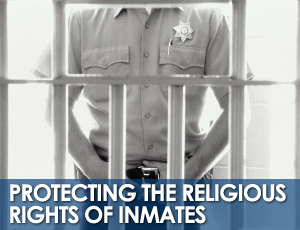
CIVIL RIGHTS UPDATE: PROTECTING THE RELIGIOUS RIGHTS OF INMATES
By Ausaf Farooqi
November 17, 2006
The practice of Islam is the most essential activity of our lives. Yet, many of our Muslim brothers can only practice Islam at the whim and will of prison officials.
They have federally protected rights but those rights are selectively enforced. They are shrouded in stigma and discrimination and locked away behind granite walls and steel bars.
Who can these Muslims, our brothers, turn to for help?
The channels given to an inmate who faces obstacles to his rights are both limited and ironic. They can turn to the prison administration or they can turn to the courts.
His first choice is to complain to the same prison officials who have created the obstacles. However, as is human nature, it is rare that the oppressing party will remedy the situation on their own will and whim. If the party was inclined to such goodness, the situation would never have occurred.
A complaint can be appealed up the chain of command to higher ranking and more removed prison officials, where one can argue that the more removed prison officials will remedy imperfections within their own prison system.
Yet, if prison guards or administrators were regularly held accountable by higher ranking officials, they would think twice before denying a Muslim his federally protected rights.
The evidence of repeated occurrences of oppression clearly indicates a lack of such accountability.
If an inmate fails to find a solution internally, he has one external source. He can file suit in court to protect his federal rights.
Of course, the one thing many Muslim inmates are sure to lack is the resources to file a suit in the courts. Furthermore, even if the inmate can file suit in court, whether through an attorney or pro se, there is a great deal of deference giving to the prison administrators.
Due process standards are substantially lower. Islamic practices can be subverted by a simple demonstration of "penological interests" which can range anywhere from security, costs, or time.
After expending all his resources, an inmate finds his legitimate claim shot down by a cursory reply from prison official and a cursory review by the courts.
It is important to note that not all prison guards and officials fail to meet the needs of prison inmates. Although there are many instances of oppression, there are also many instances where guards have been held accountable and changes have been made for Muslims.
There are many altruistic and strong individuals working in the prison system who believe in securing the facility while ensuring the rights of the inmates. Also, some courts have ruled in favor of prisoner rights, especially when the cases were egregious.
A Muslim inmate's greatest resource, the Muslim community, remains untapped. We, as members of the community, have rights and responsibilities to protect each other.
Many of these inmates just need other Muslims for support.
Perhaps they need a boost in their Islamic education. Perhaps they need an ear to listen to their hopes and dreams. Perhaps they just need to know they are in the prayers of their fellow Muslims.
We may not be able to free our Muslim brothers from arbitrary oppression, but we can volunteer our time in prisons and meet with these inmates.
We can volunteer our time to teach inmates Islam. We can raise awareness, both socially and politically, and carry the voices of the inmates beyond the granite and steel and into the hearts and minds of America.
Just standing by an inmate's side will make prison administration think twice about denying a Muslim his rights. Lastly, we can make prayer for these inmates.
As Muslims, we believe that prayer can be more effective than any grievance and any court filing. Our emotional support and physical presence will keep our brothers strong as they face tribulation daily.
This is a small step towards fulfilling our duties towards our community for the sake of Allah.
We must also realize that this is not just a Muslim/non-Muslim problem. This is not a problem divided by lines of religion and creed.
While from an Islamic perspective Muslims have a duty to help and protect their brothers, we as an American people have a duty to uphold the freedoms and rights which create the foundation of this nation.
Whether it is a Muslim who is denied his Friday prayers, a Jew who is denied kosher foods, or a Christian who is denied a Bible, the freedom to practice a religion should never be inhibited simply because one is incarcerated.
If anything, this is a time where religion and support is most essential.
Inmates, regardless of religion, have limited channels to voice their concerns. The problem is deeper for Muslim inmates who are often housed in remote prisons where the education and understanding of Islam among the prison administration is severely lacking.
Whether we are Muslim or not, we can help support these individuals. Whether your motivation spiritually oriented or for the sake of protecting American freedoms, your cause is just. In either case, we cannot turn a deaf ear to inmates' pleas.
For more information, contact .
copyright © 2006, cairchicago.org
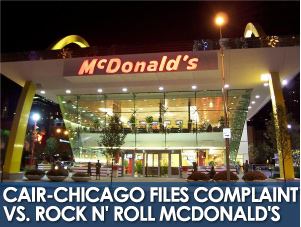
CAIR-CHICAGO FILES IDHR COMPLAINT AGAINST ROCK N' ROLL MCDONALD'S
November 14, 2006
CAIR-Chicago filed a charge of Discrimination with the Illinois Department of Human Rights (IDHR) after receiving a complaint from three Middle Eastern men who were forcibly removed by security guards at the Rock n' Roll McDonalds in Downtown Chicago.
The men entered the McDonalds restaurant speaking Assyrian, a Middle Eastern language, and were waiting in line to order when security guards belligerently approached the men and began to yell.
The men were called "camel jockeys" and "terrorists" by the guards, and were forcibly removed from the restaurant. When one of the men protested by saying that they were law-abiding individuals, the officers stated that it did not matter because they were still "terrorists" and should "go back to [their] own country." The officers also commented that the three men had no right to speak to American girls.
The men also called 9-1-1, and police officers arrived on the scene to investigate the incident but refused to file a report. The men were told by police that the incident was just a misunderstanding and that the three men should disregard it.
CAIR-Chicago's Attorney Rima Kapitan filed a complaint with the IDHR concerning a violation of Title II of the Civil Rights Act of 1964 and Illinois state law on public accommodations, which states that "it is unlawful to discriminate in the full and equal enjoyment of facilities and services by any place of public accommodation, such as a business, recreation, lodging, entertainment, or transportation facility that is open to the public."
CAIR-Chicago will continue its representation of the men in the matter.
For more information, contact .
copyright © 2006, cairchicago.org
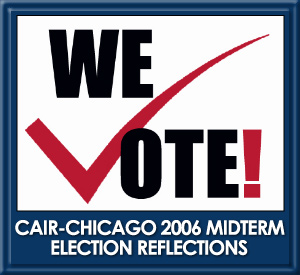
CAIR-CHICAGO 2006 MIDTERM ELECTION REFLECTIONS
November 10, 2006
This year's election had some of the hottest races, with campaigns spending money in record amounts and state wide campaigns to mobilize constituents to the polls. Voters and the general public alike fail to see the smaller incidents on Election Day. CAIR-Chicago, in conjunction with the Illinois Coalition for Immigrant and Refugee Rights (ICIRR) ran an intense political mobilization campaign, where volunteers and staff members were able to get an 'insider's perspective' and offer their reflections.
Reflections Index:
-
Discrimination at the Polls
Sadiya Ahmed
-
Poll Watching for a Candidate
By Erin Hartnett
-
Creating an Election Buzz
Sabah Ahmed
-
A Smooth Operation in the Suburbs
David Sweis
-
An Enjoyable Experience in Bridgview
By Ross Zambon
-
Managing Campaign Logisitics
By Haady Taslim
Discrimination at the Polls
Before I could urge Muslims to go to the polls on Election Day, I needed to vote, myself. Having gotten up early that morning, I went downstairs to my polling place, which happened to be in the same building I live in. As a voter, I know that the Voting Rights Act entitles me to certain things, among which is the right to present my Voter Registration Card as my identification (or have the option to show a non-picture ID), a place to vote without excessive distractions, and election judges that treat me with respect. When I walked downstairs to fulfill my civic duty, I did not get some of those rights.
There is still as much discrimination at the polls now, as there was when voter discrimination was first outlawed. Even with all the protections we have, a few minutes in some of Cook County's neighborhoods will make one think that we are back in the era of poll taxes. I went to the polling location and not only was it noisy and unprofessional, but people were being asked for multiple forms of identification, even after they presented their Voter Registration Card. In my mind, as the minds of many others, that is blatant discrimination and is a serious offense, but sadly, such is the case for many polling locations. While there were not many cases of major discrimination on Election Day that were reported, there were little problems, like being asked for identification when normally voters should not be asked. A little known fact is that certain election judges were intimidating voters of certain ethnicities and turning them away from the polls.
Though such was not the case in Bridgeview or most of the suburbs, it was a problem in the Chicago precincts. Perhaps city residents, especially in the lower income neighborhoods or with certain ethnic backgrounds are given a harder time because the chances of them not fighting back are higher. Perhaps it is that voters from the suburbs tend to vote a certain way so they cannot be bothered as it is 'the right way'. Regardless of the cause, it is important to note that the electoral process needs a desperate makeover and it needs to start with enforcing the Voting Rights Act.
- Sadiya Ahmed
Governmental Relations Coordinator
back to top
Poll Watching for a Candidate
I spent Election Day as a poll watcher at a local public school, in the small town of Libertyville, Illinois. After signing in at 5:45 am (as a poll watcher you must be credentialed, sign in when you enter the polling place and out when you leave), the first step was to ask the election judges to clarify the "100-foot line." By law, all electioneering (candidate signs, campaign propaganda, etc.) is not allowed within 100 feet of the entrance to the polling place. Once the distance is measured, a cone or marker is put up so that candidates and voters know where the limit is.
Around 6:30 am, I started to notice the signs for the Democratic candidate disappearing from the area, and realized that one of the security guards was pulling them out of the ground. He explained that three women came by and told him he had to remove the signs—that they were there illegally. These three women were not election judges or officials of any kind; they were members of the opposing party who did not want the signs in view and saw an opportunity to remove them. Following procedure, I first reported the problem to the election judges, who granted me permission to put them back, verifying that they were in fact 100 feet from the entrance.
Unfortunately, this was not the only problem I observed during my 13 hours in Libertyville. At around 8:15 am, the polling place was visited by officials from the State's Attorney's office. They had received complaints from voters that the Democrats had placed their signs too close to the door, and came to investigate. After measuring twice, the signs were approved, and the voting continued. Around 3:30 pm, I again witnessed someone pulling the signs out of the lawn. However, this time it was one of the election judges. I was told that the Superintendent had decided not to allow any campaign propaganda on school property. However, because it was a public school, he did not have the authority to make that decision. In the State of Illinois, the only way a polling place can ban all campaign propaganda from its property, is if the building is a church/religious institution or a private school. Knowing this, I reported the problem to the State's Attorney, who again ruled in my favor. This same situation happened to two colleagues of mine, at two nearby public schools.
Why argue over petty lawn signs? Isn't a sign that is 99 feet from the entrance just as effective as one that is 101 feet away? Is it worth the time and energy spent to investigate something so trivial? The reason such small infractions must be reported is that they are a tiny part of a much larger goal: ensuring a free and fair election. If something minor is ignored, what happens when it is something major? Poll watchers are there to be sure that those chosen to monitor our elections are following the law and treating each voter and candidate equally, so every citizen can exercise our most important civic duty—voting.
- Erin Hartnett
Governmental Affairs Intern
back to top
Creating an Election Buzz
On Election Day I was scheduled to assist with mobilization efforts in the Bridgeview area, but had agreed with organizer Haady Taslim that I would come only after voting myself when the polls opened at 6 a.m.
My poll location was only a block from my house, inside a private condominium complex that took me a few moments to locate. Once inside, I showed my voter registration card, and was promptly given my ballot and an area to make my voting selections.
My voting experience was nothing if not pleasant, the enthusiasm from poll watchers and early morning voters created an almost festive atmosphere. After voting, my ballot was entered into a reader, which signaled that my vote had been successfully processed.
I arrived at the Mosque Foundation soon after, where I met with Haady Taslim and Ahlam Jbara, who assigned me four Universal high school students to drive to local precincts. We were given street maps, walk sheets with names and addresses, door hang tags, voter guides, and polling place information for each precinct to help mobilize voters. At every house on our list we either met with voters or left door hangers with polling information, documenting results on our walk sheets.
We were met with several successful calls, where we informed Muslim voters that we were counting on them to make our collective voice heard, but we met obstacles too. Many voters weren't home during the day, or had incorrectly listed addresses, and at least one registered voter felt too disenfranchised to vote this year.
My high school group responded with some pessimism, voicing that they weren't sure their efforts were very effective or useful, and canvassing the large area was tedious work.
But as we spoke, we realized that our efforts, replicated by the 200 other volunteers who came to the Mosque Foundation must be reaching not only a large number of people but also creating a "buzz" due to our combined efforts. We reasoned that if our single team of 4 could reach even 25-30 Muslim households, then our entire group of door to door teams and phone bankers could easily be reaching thousands of Muslim voters that day.
Overall, I was very encouraged by the efforts and organization of the voter drive. I was impressed with the Muslim community of Bridgeview for generating such a large number of volunteers and helping with multiple accommodations, facilitating a great community effort to generate a Muslim voice this election.
I also felt that the drive was well planned by the community organizers, whose stated goal to get every registered Muslim to vote this year was supported by a multi-tiered approach of reaching out, educating, and assisting voters to that end.
Their efforts created a model for future voter drives, which I hope to see replicated next election in Bridgeview and in the many other districts of Illinois.
- Sabah Ahmed
Operations Coordinator
back to top
A Smooth Operation in the Suburbs
My poll watching experience was very positive unlike other volunteers. While I was in Bridgeview, Illinois, I spent the day traveling from polling place to another and monitoring the activities of election judges as well as registered voters who came to the polls. I first began my day at the Mosque Foundation in Bridgeview. Many volunteers arrived at the Mosque early in the morning. Everybody was very energetic and ready to help ensure that voters turned out in high numbers.
My duties included documenting the voter turnout of Muslim and Arab constituents in the southwest suburban area, along with Bridgeview. I enjoyed seeing the large number of voters that came up to support their candidates. Overall, I was happy to report that no disruptions occurred and the election judges were very respectful.
However I did learn of some problems occurred throughout the city. I feel that more emphasis should be put on protecting inner-city constituents in the future as a result of those complications. We should all embrace our right to vote and mutually honor that right irrespective of political ideology.
- David Sweis
Civil Rights Extern
back to top
An Enjoyable Experience in Bridgview
As a first time Election Day poll watcher, I was surprised at how smoothly the election judges managed the precincts and election process. When I arrived at the Mosque Foundation at 7:00 a.m., I saw 20 gallons of Dunkin Donuts coffee lined against the wall, suggesting we pool-watchers had a long day ahead of us. Twelve hours of open polls hardly seems like enough time for a group of volunteers to monitor each precinct. But the superb individual efforts from each volunteer proved successful.
Of the five locations I monitored in Bridgeview, I did not witness one major problem. When voters made mistakes on their ballots, the election-officials eagerly helped them correct the errors, or offered them a new ballot altogether. For over eight hours, I did not see one voter turned down at the polls. In fact, the longest one single voter had to wait in line to cast his or her vote was only 10 minutes. Martha, one election judge, even took the time thoroughly explain how the voting machine worked to one voter who seemed perplexed about the 240 year old process. While I can’t speak for the entire state, it was clear that some of the polls in Bridgeview were run successfully, and the people were able to exercise their right to vote without any difficulty. Thanks Uncle Sam.
- Ross Zambon
Civil Rights Extern
back to top
Managing Campaign Logisitics
The entire night before Election Day, I was up trying to tame the monster. The monster was the Get-Out-the-Muslim-vote machine we had created: it sprawled four townships, twelve different towns, 42 precincts, and would target over 1300 households and almost 2,000 Muslim voters. The monster was manned by over 200 volunteers, who would drive to 35 different precincts, knock on 1300 doors and call 2,000 Muslim voters on our 15 phone lines. The monster was fed on 12 dozen donuts, 10 gallons of coffee, 12 cases of water, 8 cases of soda, 30 pounds of pasta, 70 bag lunches and 22 thin-crust pizzas.
The sheer size and complexity of this operation frightened me – how could it possibly be tamed?
After a frantic evening puzzling over precinct maps and trying to schedule the day, I waited for the first wave of volunteers to show up. A mass of high school students casually walked into the basement of the Bridgeview mosque, laughing, socializing, eyeing the donuts, but looking around skeptically. I waited impatiently for the adult chaperones to show up so they could drive these students to their neighborhoods and put them to work.
We waited restlessly for the chaperones to show up as the minutes ticked by. Finally, at 9:30 the adults started trickling in. We grabbed up the adults as soon as they walked through the door and divided them up with teams of students. By 10 am, we had almost 15 teams out in the field knocking on doors. As the last team of students embarked on the field, an ominous hush came over the basement of the Bridgeview mosque.
Back at headquarters, 15 students were hunched before extensive phone lists calling all of the Muslim voters we could identify in our district. I caught my breath and witnessed our monster at work.
- Haady Taslim
New Americans Democracy Project Fellow
Former CAIR-Chicago Governmental Relations Intern
back to top
For more information on the CAIR-Chicago's political mobilization efforts, contact Sadiya Ahmed at
copyright © 2006, cairchicago.org

Additional Related Links:
- Record Numbers Mobilize to the Polls in the Southwest Suburbs on Election Day
- The Mobilizer
Pre-Election News Coverage:
- Beliefnet: U.S. Muslims Mobilize in 2006 Elections
- Reuters: U.S. Muslims moving into prime-time politics
- Northwest Indiana Times: Survey Shows Muslims flexing political muscle
- Radio Islam: Elections: What's Good For Muslims, What's Good For America?
- Radio Islam: Injustice at Family Law Court
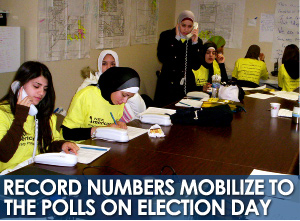
RECORD NUMBERS MOBILIZE TO THE POLLS IN THE SOUTHWEST SUBURBS ON ELECTION DAY
By Sadiya Ahmed
November 9, 2006
On Tuesday, November 7, 2006, two hundred volunteers poured into the Mosque Foundation's basement where New Americans Democracy Project Fellow Haady Taslim (a project lead by the Illinois Coalition for Immigrant and Refugee Rights and co-hosted by CAIR-Chicago) waited anxiously to start the day. It was Election Day and there was a buzz in the Bridgeview community, as well as other surrounding communities.
The goal was simple: to bring Muslims in the southwest suburbs in record numbers to the polls.
As a CAIR-Chicago pilot project to empower American Muslims and encourage political engagement, the NADP was a major success with a record number of Muslims not only registering to vote but turning out to the polls on Election Day. A 50% increase in voter turnout in the Mosque Foundation's Area (Palos 44) was the highest the area has seen and was well above the expected turnout. Voter registrations in the area also rose by 80%.
In neighboring areas, voter turnout with registered Muslim voters increased significantly as well, with record turnouts in most precincts. As a non-partisan campaign, volunteers and leaders ran into some difficulties when it came to communicating with community members who insisted on being told who to vote for. Voters were given the CAIR-Chicago Voter Education Guide, which provided them with detailed information on the candidates as well as the voting records of incumbents.
As a pilot project for CAIR-Chicago, the NADP highlighted the strengths and weakness of the Muslim community that is developing. "As a relatively young community, we have a long way to go. Though we ran into a lot of problems earlier in the campaign and had a rough start, we went above and beyond the expected numbers," remarked Sadiya Ahmed, CAIR-Chicago Governmental Relations Coordinator. "The success of this project is only the beginning. We have a long way to go."
The NADP was initially started in July when Community Organizer, and NAPD Fellow, Haady Taslim and a team of volunteers worked on registering eligible American Muslims to vote. The numbers climbed over the months to a final count of 1055 by the registration deadline in October, a number that has never been achieved in such a short amount of time. The project then switched gears to a Get Out the Vote Campaign (GOTV), where thousands of registered voters were contacted throughout the month, through mass mailings, door-to-door canvassing, and phone calls. The message was simple: "Go out and vote on Election Day!"
Though the project's results are only the start of a long term goal, it set the groundwork for the future, for the American Muslim community to become active in their communities, and encourage each other to become active constituents. With the 2006 election finished and the 2008 election is next on the list.
For more information on the CAIR-Chicago's political mobilization efforts, contact Sadiya Ahmed at
copyright © 2006, cairchicago.org

- See Above Article for Additional Resources

In the News
- International Herald Tribune: For U.S. Muslims, it's the American way
-
November 7, 2006
- Chicago Maroon: Experts debate Islam
-
November 7, 2006
- United Press International: Rep. urged to clarify race profile remark
-
November 6, 2006
Press Center
- Press Release: Chicago Resident Missing; Family Asks for Help in Locating Him Day
-
November 16, 2006
- Media Advisory: Mayor Daley To Preside At Mosque Foundation Garden Ceremony
-
November 10, 2006

- CAIR-Chicago Presents on Community Builder's Post-Election Day Panel Discussion
-
November 16, 2006
- Three Muslim Men Sworn-In as U.S. Citizens
-
November 16, 2006
- Muslim Man's Delayed Citizenship Process Comes to End
-
November 14, 2006
- CAIR-Chicago Files Motion to Move Up Hearing
-
November 14, 2006
- Local Muslims Donate Public Garden to the City of Chicago
-
November 14, 2006
- CAIR-Chicago Present on Career Day Panel at Aqsa School
-
November 14, 2006
- CAIR-Chicago Attends Latino Caucus / ICIRR Press Conference
-
November 13, 2006
- CAIR-Chicago Communications Coordinator Presents at Loyola University on Charity in Islam
-
November 10, 2006
- CAIR-Chicago Files IDHR Complaint Against Rock n' Roll McDonalds
-
November 10, 2006
- CAIR-Chicago 2006 Midterm Election Reflections
-
November 10, 2006
- CAIR-Chicago Becomes Affiliate of Illinois Legal-Aid Online
-
November 9, 2006
- Communications Coordinator Speaks at Symposium Titled 'Justice in Evangelical Christian and Islamic Thought'
-
November 9, 2006
- Record Numbers Mobilize to the Polls in the Southwest Suburbs on Election Day
-
November 9, 2006
- Photos: Record Numbers Mobilize to the Polls in the Southwest Suburbs on Election Day
-
November 7, 2006
- Finalizing Plans for an Upcoming Civil Rights Event
-
November 6, 2006
- Lombard Parking Ban Discussion Continues
-
November 6, 2006
Recent Events
- CAIR-Chicago Governmental Relations Coordinator to Present at Community Builders Meeting
November 16, 2006
- Executive Director to Speak at Benedictine University on Confronting Confusion with Dialogue
November 15, 2006
- CAIR-Chicago Governmental Relations Coordinator to be a Panelist on Career Day at Aqsa School
November 13, 2006
- Executive Director to Address London Town Hall
November 10, 2006
-

- Communications Coordinator, Sultan Muhammad to Speak on the significance of Charity in Islam
November 9, 2006
- CAIR-Chicago Governmental Relations Coordinator to Appear on Radio Islam
November 7, 2006
- CAIR-Chicago Community Organizer to Appear on Radio Islam
November 6, 2006
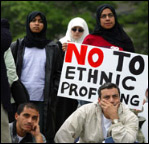 
RECENT CASES:
Civil Rights Update – 11/20/06
The Civil Rights Department at CAIR-Chicago currently has 645 cases documented in which 263 cases are active and are being pursued by department personnel. Below are the cases that were reported to CAIR-Chicago within the last two weeks.
Government:
- Seven more Muslims have reported delays in their citizenship process, having applied for their citizenship and passing all necessary USCIS requirements, but have been waiting for citizenship status due to pending background checks. CAIR-Chicago is incorporating these cases into the Citizenship Delay Project. For more information on the Citizenship Delay Project, please see the action alert below.
- A Muslim man who has been living in the U.S. since the age of 13 is facing deportation due to past criminal charges. He is trying to stay in the country in order to support his wife and nine children. CAIR-Chicago is looking into possible options and legal representation for the man.
- A Muslim man is experiencing a delay in obtaining his green card for permanent residency. CAIR-Chicago has referred the man to the National Immigrant Justice Center for legal advice.
School:
- A Muslim student enrolled at a beauty school was subjected to derogatory treatment by fellow students and staff. The student requested to be moved to another location and is awaiting a decision. CAIR-Chicago is monitoring the situation and will take whatever action deemed necessary should the school not meet the student's needs for accommodation.
ONGOING PROGRESS:
View reports of ongoing progress for cases with the Civil Rights Department in the "Progress Report" section.
ACTION ALERTS:
Citizenship Delay Project - Religious Discrimination Delays Citizenship Process:
As a joint effort with the Arab American Action Network (AAAN), CAIR-Chicago is asking individuals who passed a citizenship examination and have been waiting for over 90 days, or have been waiting for a Green Card for permanent residence for over 90 days to contact us at either or
Travel Free Project - Muslim Americans Detained and Questioned When Traveling Outside of the U.S.:
As part of a potential class action law suit, the American Civil Liberties Union (ACLU) and CAIR-Chicago is asking anyone who has been detained and questioned on return to the US at any border crossing (land or airport) to please contact immediately. It is important for Muslims who have faced this type of treatment to join the lawsuit so as to show that it is not an isolated case. The more people that join the case the more strength it will have to force positive changes in how Muslim Americans are treated in the future at our borders.
Also, if you are being consistently delayed, detained, or have otherwise had your rights violated while traveling, contact .
Religious Discrimination at Standardized Testing Centers:
As part of a potential class action law suit, CAIR-Chicago is asking for anyone who has experienced any form of religious discrimination at a testing center to please contact us at . An example of a possible form of religious discrimination includes requiring or requesting the removal of a headscarf for searches, or discriminatory remarks made by employees about Muslims or Islam.
The facts of the above case are as follows:
A Muslim student was asked to remove her headscarf on two separate occasions at a testing center before she began a standardized test required for graduate school. The supervisor and employees of the testing center refused to show her a written copy of the policy requiring Muslim women wearing a headscarf to be searched. A witness at the testing center also observed the employees making discriminatory remarks about Muslims while the victim was taking the test.
Please let us know if you or someone you know have experienced a similar incident and would like to take action to prevent such forms of religious discrimination at standardized testing centers in the future.

 - CAIR-Chicago Co-Sponsoring Civil Rights Panel Discussion
November 30, 2006
- Executive Director to Speak at upcoming Global Issues Forum at Benedictine University
March 2007
|
 |

Three Muslim Men Sworn-In as U.S. Citizens:
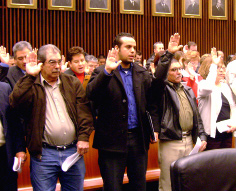
Three Muslim men were issued their oaths and naturalized as U.S. citizens today. The men were a part of the class action complaint filed by CAIR-Chicago, the National Immigrant Justice Center (NIJC) and Competition Law Groups.
More...
Related Story:
Muslim Man’s Delayed Citizenship Process Comes to End
 MISSING PERSON ALERT: MISSING PERSON ALERT:
Chicago Resident Missing; Family asks for help in locating him
 Irfan Vora, age 30, has been missing since November 10, 2006. Last known contact with Irfan was that day as he was leaving home for Friday prayers. It is not known if he made it to the prayers. Irfan Vora, age 30, has been missing since November 10, 2006. Last known contact with Irfan was that day as he was leaving home for Friday prayers. It is not known if he made it to the prayers.
Read Press Release
Local Muslims Donate Public Garden to the City of Chicago:
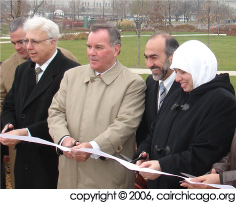 Monday, November 13th marked a historic day in the life of Chicago's Muslim community thanks to a display of vision and generosity by Bridgeview's Muslim leadership. Monday, November 13th marked a historic day in the life of Chicago's Muslim community thanks to a display of vision and generosity by Bridgeview's Muslim leadership.
On that cold Monday morning, Mayor Richard M. Daley, Mayor of the City of Chicago, and Tim Mitchell, Chicago Parks Superintendent, joined local Muslim community leaders and activists in the opening ceremony of the "Mosque Foundation Garden" in a plot of land immediately adjacent to the Adler Planetarium off of Lake Shore Drive.
More...
CAIR-Chicago Welcomes A New Activist to the Team
 Shadtha Blan has joined the CAIR-Chicago team as a Communications Intern. She is attending the University of Illinois at Chicago, where she is studying journalism and marketing. She believes this internship will give her excellent insight and experience that books and lectures may not be able to provide. This is Shadtha's third year at UIC and she is involved with the newspaper as a volunteer and helps muscular dystrophy students with their studies. She was worked with Horizons (a muscular dystrophy camp) for the past four years and has a great interest in helping those less fortunate. Shadtha Blan has joined the CAIR-Chicago team as a Communications Intern. She is attending the University of Illinois at Chicago, where she is studying journalism and marketing. She believes this internship will give her excellent insight and experience that books and lectures may not be able to provide. This is Shadtha's third year at UIC and she is involved with the newspaper as a volunteer and helps muscular dystrophy students with their studies. She was worked with Horizons (a muscular dystrophy camp) for the past four years and has a great interest in helping those less fortunate.
Shadtha believes the journalism world is lacking middle-eastern correspondents and writers and hopes to change that fact for the future. Thus, she believes CAIR-Chicago is a tremendous stepping-stone to reaching her goals.
CAIR-Chicago's Muslim Activist Website
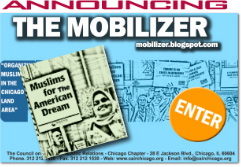
Are you an Undergraduate or Graduate Student Looking to Earn College Credit While Interning at CAIR-Chicago?
CAIR-Chicago, the local chapter of the Council on American-Islamic Relations (CAIR), is currently offering 17 new internship opportunities. CAIR is the nation's largest Muslim civil rights organization. The organization's mission is to enhance the understanding of Islam, encourage dialogue, protect civil liberties, empower American Muslims and build coalitions that promote justice and mutual understanding.
All internships are unpaid. Internships last one semester and include a 12-hour/week commitment. Applicants should email a resume and cover letter to Dina Rehab, Outreach Coordinator, at: .
APPLICATION GUIDELINES:
clearly indicate which internship opportunity you are applying for in your cover letter. If you are applying for more than one position, please list in order of preference. All fall applications are due by August 28th (please note: fall internships run from August/September through December/January). Applications that do not list the above information will not be processed. If you have any questions, please email all inquiries to . Students interested in receiving class credit, should indicate so in their cover letters. Credit will be arranged during the first week of the academic semester.
Listing of all internships by department:
Civil Rights:
CIVIL RIGHTS INTERN
LAW CLERK (Law Students Only)
Communications:
COMMUNICATIONS INTERN
CHURCH PROJECT INTERN
FAITH CORE ONLINE MAGAZINE INTERN
Governmental Relations:
GOVERNMENTAL RELATIONS INTERN
COMMUNITY ORGANIZING LEAD INTERN
VOTER EDUCATION PROJECT INTERN
POLICY RESEARCH INTERN
Operations:
OPERATIONS INTERN
RECEPTIONIST
INFORMATION TECHNOLOGY INTERN
EXECUTIVE ASSISTANT INTERN
Outreach:
PUBLIC RELATIONS INTERN
PUBLIC EDUCATION INTERN
HUMAN RESOURCES INTERN
MUSLIMS CARE PROJECT INTERN
Dina Rehab is CAIR-Chicago's Outreach Coordinator, she can be reached via email at

The Muhammad Salah Trial is in Session
The trial is open to the public. Your courtroom attendance is encouraged.
Why:
The Muhammad Salah Trial is of immense importance for supporters of anti-torture, due process, and rule of law. It is marks the first case that an American court has allowed the prosecution of an American citizen based on an admission obtained under torture in a foreign country and in a language the defendant does not understand. Mr. Muhammad, a long time Chicago-land resident, was arrested, tried, and jailed for several years while administering charitable aid to victims of the war-ravaged Palestinian territories. He was accused by the Israeli government of supporting terrorism. For many observers, the Muhammad Salah case amounts to political persecution.
This Week's Schedule:
- Monday Morning Session
November 20th
8:45 am - 12:00 noon
- Monday Afternoon Session
November 20th
1:30 pm - 5:00 pm
- Tuesday Morning Session
November 21st
8:45 am - 12:00 noon
- Tuesday Afternoon Session
November 21st
1:30 pm - 5:00 pm
- Wednesday Afternoon Session
November 22nd
1:30 pm - 5:00 pm
You can leave any time during the trial, but you can get in only during breaks.
Where:
Courtroom of Judge Amy St. Eve
Room 1241
Dirksen Federal Building
219 S. Dearborn (intersection of Jackson &Dearborn) - Chicago
For more information, email:


    

Executive Director
Ahmed Rehab
Civil Rights Coordinator
Christina Abraham
Outreach Coordinator
Dina Rehab
Governmental Relations Coordinator
Sadiya Ahmed
Operations Coordinator
Sabah Ahmed
Communications Coordinator
Sultan Muhammad
Staff Attorney
Heena Musabji, Esq.
Legal Advisor
Maaria Mozaffar
Community Organizer
Haady Taslim
Sensitivity Training Coordinator
Veronica Zapata
Board of Directors
Alif Muhammad
Ahmed Rehab
Hina Sodha, Esq.
Yaser Tabbara, Esq. - Secretary
Mazen Kudaimi, MD - Vice President
Safaa Zarzour, Esq. - President

Click Here

Click Here

Click Here
|
 | CAIR-Chicago
| CAIR-Chicago
 | CAIR-Chicago
| CAIR-Chicago
